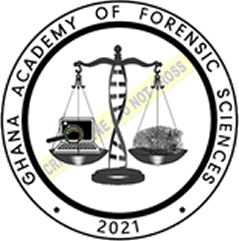
History of the birth of the Ghana Academy of Forensic Sciences
In the year 2012, amidst the corridors of forensic investigation and pathology, an idea was conceived, one that would change the trajectory of forensic science in Ghana. It was within the Morbid Anatomy Department that two visionary minds, DCOP Dr. David Agyemang, then Director of the Crime Lab, and Dr. Pet-Paul Wepeba of the Pathology Division at the 37 Military Hospital, first discussed the need for a dedicated forensic science body in Ghana.
Their shared vision was to create a society that would bring together experts, researchers, and practitioners to advance forensic science and its application in the justice system.
Recognizing the need to build a stronger foundation, the idea was further nurtured in a follow-up meeting held at the Crime Lab, where two other forensic science enthusiasts joined the conversation: Mr. Alex Oppong, then with KPMG, and Dr. Albert Antwi Bosiako of the e-Crime Bureau. In the office of DCOP Dr. David Agyemang Adjem, these four pioneers deliberated extensively on the structure and identity of the society. Several names were proposed, but after careful consideration, they finally settled on the Forensic Science Society of Ghana (FSSG), a name that would soon become synonymous with forensic excellence in the country.
With the foundation laid, the society began to take shape. Meetings were subsequently held at the Pathology Division of the 37 Military Hospital, where a larger group of forensic professionals gathered to refine and adopt a working document that would guide the society’s operations. The momentum grew, and what started as a modest initiative gained national recognition as a professional platform for forensic scientists, crime investigators, legal experts, and academics.
As the field of forensic science evolved, so did the Society. Recognizing the need for a name that better captured its professional scope and national mandate, the Forensic Science Society of Ghana underwent a transformation in 2021. It was rebranded as the Ghana Academy of Forensic Sciences (GAFS) and officially registered with the Registrar General of Ghana as a professional body. This change reflected the Academy’s commitment to forensic education, research, and professional development on both national and international levels.
From these humble beginnings, the Ghana Academy of Forensic Sciences has grown significantly, attracting members from across Ghana and beyond. The Academy now stands as a beacon of forensic excellence, fostering collaboration, knowledge exchange, and capacity building among forensic professionals.
While Ghana’s legal and forensic challenges may be unique, forensic science remains a discipline of global significance. The Academy continues to embrace the international nature of forensic inquiry, engaging in global discussions and collaborations that enrich local forensic practice. Through participation in international forums and cross-border exchanges,
the Academy not only enhances its knowledge base but also contributes to solving forensic challenges unique to Ghana.
From a conversation in the Morbid Anatomy Department to a thriving professional body, the journey of the Ghana Academy of Forensic Sciences is a testament to vision, dedication, and the relentless pursuit of forensic excellence. The Academy remains committed to advancing forensic science for justice, security, and national development, one breakthrough at a time.